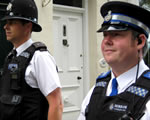 Go to main content
Go to main content
Archive Website of the UK government
Please note that this website has a UK government accesskeys system.
Main menu
Page menu
Crime and justice

What happens after you report a crime committed against you

If you have been the victim of crime and reported the incident to the police, you have the right to know how the case is progressing. Find out what you can expect while the police are investigating the crime.
Reporting a crime
Reporting a crime will help the police catch the criminal, and could stop other people becoming victims of crime. The police will ask you to make a statement with details of the crime.
See the links below for details on how to report a crime committed against you.
Finding out if the police can investigate the crime
Once you have reported a crime, the police will decide if they can investigate the case.
The police will tell you if they can’t investigate within five days of you reporting the crime, and give you the reasons why.
If they do investigate, they will give you an update on the case at least once a month until it is closed.
Keeping in touch with the police
You will get the contact details of the police officer dealing with the incident
You will be given a crime reference number and the contact details of the police officer dealing with the incident. You’ll need the reference number if you contact the police again or if you need to make an insurance claim.
You have a right to be kept informed, so you can ask for updates when you need them.
Phone the police if you remember anything else about the crime after you make your statement.
The police will be able to put you in touch with other groups that can help you, like Victim Support.
Telling the police how the crime has affected you
You can tell the police officer in your own words about how the crime has affected you. This is called a ‘victim personal statement’ and can include things like:
- the effect on your health, family or quality of life
- if you no longer feel safe
- if you want to claim compensation for an injury, loss or damage
Information from this statement can be used by the court when deciding how to punish the criminal.
How the police collect evidence
Investigations can be detailed and take a long time, and some cases are never solved
Investigations can be detailed and take a long time. The police will have to gather evidence to catch the criminal or prove the case against them. You may have to wait months before there is a breakthrough in the case.
Sadly, some cases are never solved. The police may not be able to catch the criminal or there may not be enough evidence to charge them.
The police may:
- get statements from witnesses
- interview suspects
- collect evidence from the scene of the crime, such as fingerprints or other forensic evidence
You may be asked to look at photos or an identity parade to pick out the offender. Many police stations have special rooms with one-way screens so you can view the identity parade without being seen.
If you have been hurt in an attack, the police will make sure you get medical help. This can be an upsetting experience, but remember that evidence from a medical check-up could be used to bring the attacker to justice.
Protection during the investigation
If you are at risk, or have been a victim a number of times, the police might be able take extra steps to protect you. This could involve:
- panic alarms
- increased police patrols
- around-the-clock surveillance
If you are harassed or threatened at any point then contact the police at once. It is a crime to intimidate (scare or bully) anyone helping the police with a case.
A court may be able to make a restraining order to stop someone coming near you - ask the police if you think you’re at risk.
Protecting your privacy
To help with an investigation, the police might give the media certain details about your case. This is to find out if there are witnesses who could help them solve the crime. The police will normally ask your permission before giving out any information.
If you have been sexually attacked, it is against the law to publish your name, photo or other details which could identify you.
What happens at the end of the investigation
The police will let you know within five days if someone is:
- arrested
- charged
- set free
- released on bail (let out under conditions)
- given a caution, reprimand, final warning, or penalty notice
If someone is charged with the crime
When the police have finished with an investigation, they will pass the case on to the Crown Prosecution Service.
The Crown Prosecution Service will decide if there is enough evidence to charge someone and take the case to court. They will take into account the effect of the crime has had on you when they decide if they should prosecute. They will tell you within five days if they decide to drop or alter the charge.
Use the links below to find out more about going to court.
 Facebook
Facebook Twitter
Twitter StumbleUpon
StumbleUpon Delicious
Delicious Reddit
Reddit
